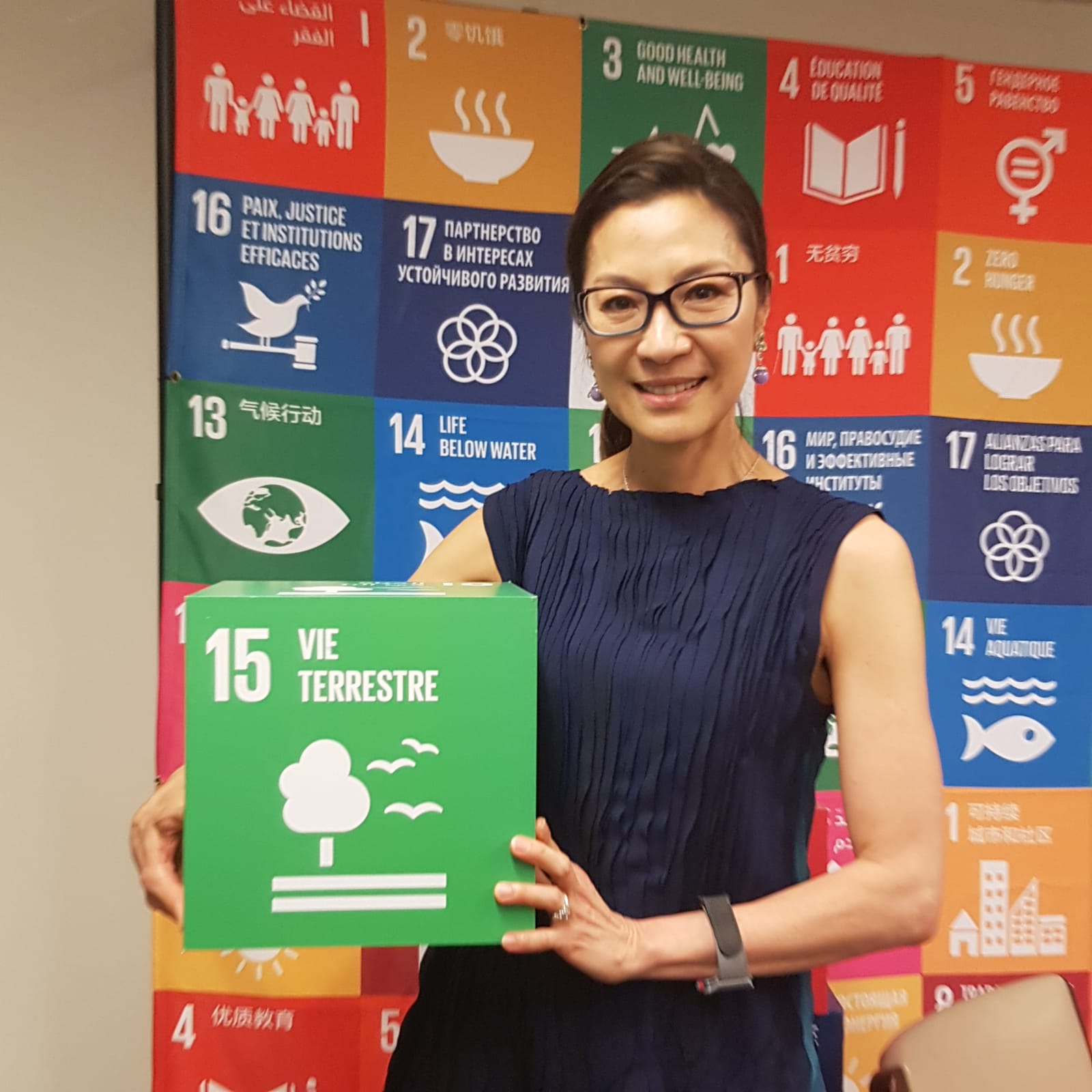As UNDP Goodwill Ambassador, award-winning actor Michelle Yeoh has taken on another role to raise awareness and mobilize support for the Sustainable Development Goals, launched in 2016 to end poverty in all its forms by the year 2030. The Malaysian-born film star was appointed UNDP Goodwill Ambassador on 15 March 2016. She shares with us on her engagement for sustainable fashion.
What does sustainable fashion mean to you and why is it so important for achieving the UN Sustainable Development Goals?
Sustainable fashion to me means amplifying the creative power of designers and engaged citizen to shift one of the most polluting and socially unjust industries onto a sustainable path, one that contributes rather than limits the achievement of the Sustainable Development Goals (SDGs).
We know the story: the increased production of clothes requires more natural resources to grow crops like cotton and floods markets with non-degradable materials like polyester, which shed millions of microfibers into aquatic environments. This puts more stress on our land and water resources and increases the carbon emissions associated with the production of polyester, which is made from petroleum. Chemicals used in the cultivation of cotton, in dyes and during processing are polluting rivers and harming ecosystems and people’s health. Despite fashion being a trillion dollar industry, workers still face low wages and unsafe working conditions. Accompanying this accelerated production are mountains of waste. Not only are we buying twice the amount of clothes compared to only 20 years ago, but we are wearing these clothes for a much shorter time, resulting in the equivalent of one garbage truck of textile waste going to landfills or being burned each second.
This is why I believe it is crucial that fashion becomes an enabler to reach the SDGs. Luckily, we can see positive change happening: consumers are demanding more transparency from fashion brands as they keep challenging them with the hashtag #WhoMadeMyClothes. And brands have started to respond with corporate responsibility strategies and international commitments. In 2018, more than 90 brands signed the Fashion Industry Charter for Climate Action, committing to reduce greenhouse gas emissions by 30 percent by 2030. In 2019, 32 companies representing 150 brands, signed the Fashion Pact, which includes commitments on climate, biodiversity and oceans. The pact recognizes “that our living natural capital is in danger and that this needs to be remedied to have a foundation for a thriving society and business”.
We need to finally recognize that a sustainable fashion industry would benefit all 17 SDGs, agreed by world leaders as the best way to end poverty and protect the planet by year 2030.
How do you “walk the talk” as UNDP Goodwill Ambassador and film star?
My goal is to leverage the platform I’ve been given through my career in film, television and entertainment to raise awareness of and mobilize support for the Sustainable Development Goals – specifically, how each and every one of us can play an important role in making them a reality.
That’s why I have teamed up with UNDP to raise awareness of the importance of making our way of life on this planet more sustainable for the Earth and more prosperous for all of its inhabitants.
There is a lot that consumers, for instance, can do through their purchasing power and their commitment to reuse and recycle, governments through more stringent regulations, and companies through innovative business models and a beyond-profit mentality. Everybody involved needs to work together.
We want to reach and inform as many people as possible. That was also my intention behind starring in the short sustainable fashion documentary called “Made in Forests”, which was produced by UN TV and the UNECE/FAO Forestry and Timber Section in 2018. It showcases the designs of the Green Carpet Awards winner Tiziano Guardini, who made a dress using only natural materials such as fabrics from certified wood. My goal is to help empower people around the world to take action and use creativity to win the fight for a better tomorrow. That’s the only way we can make real change in this world.
What are your top tips on being more sustainable when it comes to purchasing clothes?
Consumers may not be aware of it when they shop online or in stores for their favourite outfits, but the clothes they buy are a mirror reflection of what is going on in the social and natural environment. Consumers have some power in at least demanding transparent business practices and challenging brands to do better in terms of their social and environmental performance. Whenever you face the decision of buying a new dress, first ask yourself if you really need it and imagine that the item will stay for you for a long time. This will make it less likely that you will throw out a dress after having worn it once. Choose quality over quantity and check the labels: avoid buying garments that contain non-renewable and non-biodegradable material blends that contain polyester and other synthetics. Choose certified over non-certified fabrics, and research into the brand’s labour practices. Let your fashion choice be your expression, your voice, and your vote for a sustainable future.
On the red carpet, fashion and movie stars are inseparable – do you see an increase in awareness about sustainable fashion in the entertainment industry?
Over the past few years, film stars have increasingly paid attention to sustainable fashion, for example by taking part in the Green Carpet Challenge. This is an initiative that pairs glamour with ethics and puts sustainability in the spotlight. Emma Watson has taken part in it, and so have Cate Blanchett, Juliane Moore and Colin Firth. I see a lot of potential in film stars and social media influencers advocating for more sustainable fashion on and off the red carpet. Whatever they do, whatever they say can easily inspire and impact people around the world. When you have over a million people that follow every picture you post on Instagram, your message will spread very quickly.



